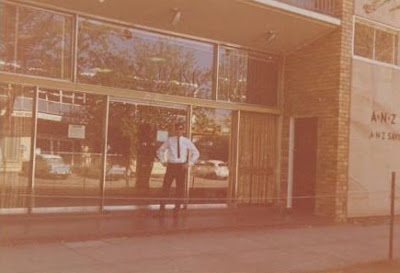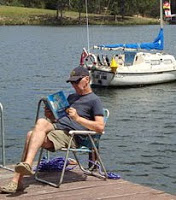Apocryphal (that means being of doubtful authenticity, Des) or not, it is said that one day an excited young man came to Alexander Dumas ('The Three Musketeers', remember?) with the most superb idea for a novel.
"You have a good plot?" Dumas asked.
"A plot that is full of excitement; characters that breathe; settings that bedazzle the eye; and a suspense that is truly unbearable", the young man said.
Dumas grabbed him by the shoulders and cried, "Good! Now all you need to make it a novel is 200,000 words."
Well, I've put the following story through an online word counter and it comes to barely six hundred words, so you may want to embroider it a bit in your own mind to turn it into anything 'novel'. Anyway, here it goes:
My old mate Noel Butler was a bit of an Errol Flynn-type, helped along by the fact that he'd spent most of his adult life in New Guinea. In 1967, when I first met him aboard the PATRIS as I returned to Europe after a ho-hum first two years in Australia, I'd just turned 22 while he was already of an age that made him popular with a certain type of dowager who was on her way to Europe to spend her late husband's fortune.
Lack of social, but primarily dancing, skills, and an even greater lack of money prevented me from partaking in the nightly shipboard delights, but Noel and I spent almost every daylight hour of every day hunched over a chessboard, and our mutual love of chess and my fascination with his adopted home, the mythical island of New Guinea, spawned a friendship that was to last almost thirty years until his death in 1995.
Born in 1920 in Bundaberg, Noel enlisted in the Army and was sent to New Guinea (where he took part in the Bougainville Campaign) and after his discharge in late 1945 went back there. He never chose the orthodox road, behaved like a good little squirrel, and turned domestic, but instead freewheeled through life with both hands off the handlebar.
If New Guinea was a backwater, then Wewak in the far-flung Sepik District was a backwater of a backwater, and it was there that Noel had found his niche, venturing out every couple of years to go on an African safari or take a bumboat ride through the Indonesian archipelago.
I visited him on his little 'hacienda' just outside Wewak several times, and he visited me on Bougainville and in Lae and elsewhere, but mostly we stayed in contact through correspondence which sometime in the early 70s took a colourful turn when he began using writing-paper embellished with pretty butterflies in the corners and along the edges.
I picked him up on this, and he told me that a lady-friend in Brisbane had sent him several pads of this writing-paper. By the time I visited him again, I had become quite a lepidopterist (that's someone who collects and studies butterflies, Des) but thought no more of it until one night at the Sepik Club he introduced me to a matronly barmaid. Sitting down at our table, he said, pointing back at her, "She's the one who sent me those writing-pads", and over a few beers the story began to unravel.
Apparently, she'd taken a shine to Noel and come up to Wewak to stay with him. There's little entertainment in the islands and visitors are always welcome but Noel also liked his privacy, so after a few weeks he asked her when she was going back to Brisbane. "Oh, I'm not!" she cried, "I've packed up everything in Brisbane and I'm staying here with you."
I don't know when Noel had decided that domestic life was not for him, but it was long before this particular lady-friend tried to get her man. As he confided in me, "If I'd wanted to get hitched, I would've done so while I could still have commanded a premium", or words to that effect.
Anyway, in the most tactful way possible in such a delicate situation, he showed her the flyscreened door. "So how come she's still here?" I asked. She'd found herself a new lover - the local plumber; shit happens! - and, to cover her tracks, had spread the rumour that Noel was a homosexual.
Hell hath no fury like a woman scorned (which, by the way, sounds very Shakespearean but you can thank William Congreve for this paraphrase).















 As a young bank clerk in front of the
As a young bank clerk in front of the 















